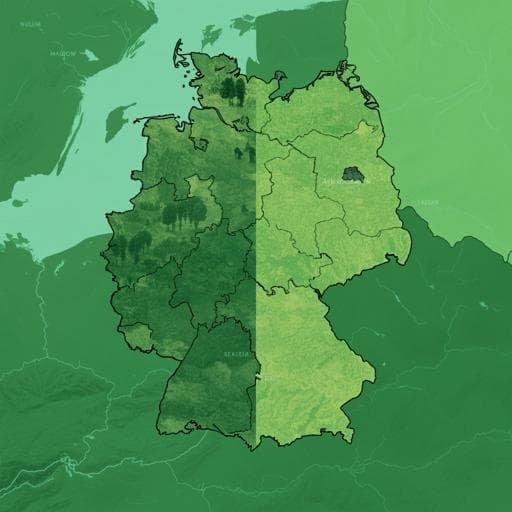
Environmental Studies and Forestry
Exploring the variances of climate change opinions in Germany at a fine-grained local scale
L. Mewes, L. Tuitjer, et al.
The study addresses the largely unexplored question of how and why public climate change opinions (CCOs) vary at fine-grained subnational scales. While polarization in climate opinions is well-documented, most evidence comes from individual-level analyses or national-level aggregates, particularly in the United States. Such focus overlooks local-scale differences that matter for policy implementation, since climate adaptation and mitigation actions require collective support at local levels. Prior work shows that individual sociodemographic characteristics (e.g., gender, age, education, income, political beliefs) predict CCOs, but compositional differences alone do not explain variation between places with similar demographics. The authors propose four contextual hypotheses for Germany: (1) an urban–rural divide with higher awareness in urban settings due to context and composition effects; (2) higher awareness in economically prospering than declining areas, reflecting broader geographic polarization and political attitudes; (3) the role of local political culture—specifically historical support for the Green Party—as a proxy for enduring local green norms that shape opinions via social impact; and (4) a persistent East–West divide stemming from differing environmental politics and civic mobilization in the former FRG vs. GDR, with legacies likely persisting decades after reunification. Germany is an informative case due to its leadership reputation in climate policy, multi-party system, smaller geographic size relative to the US, and its unique East–West history.
Existing research documents geographic variation in CCOs primarily in the US, where large spatial, socioeconomic, and political heterogeneity and the two-party system contribute to pronounced local polarization. Individual-level determinants of CCOs include gender, education, and political ideology, but extrapolating these to the local level leaves unexplained variation. Evidence on an urban–rural divide in environmental attitudes is mixed, with clearer divides reported in some countries (e.g., China). The relationship between socioeconomic prosperity and environmental concern is ambiguous at the national level across studies. Theoretical and empirical work on local cultures suggests that place-specific norms and values influence preferences and behaviors, and that such norms can persist over time (path dependence). Germany’s East–West division created diverging environmental ideologies and opportunities for environmental activism, suggesting a potential enduring divide in CCOs. This study extends prior work by jointly examining contextual factors—urbanity, prosperity, local green political cultures, and East vs. West—while controlling for established individual-level predictors.
Data: The study uses the Green Socio-Ecological Panel (Green SOEP), a nationally representative household survey conducted between 2012 and 2015 (4 waves; n=12,612 households). It includes sociodemographics, geolocations (mapped to 4,667 municipalities), and climate opinion items. Three CCO dimensions were used: belief that climate change has already begun (n=11,903), concern about consequences (n=8,487), and perceived importance of collective responses (n=12,337). Items were dichotomized: belief=1 if respondent chose 'already taking place'; concern=1 if rating ≥5 on a 7-point scale; importance=1 if rating ≥4 on a 5-point scale. National averages: 82% belief, 58% concern, 85% importance. Geospatial estimation: To map local CCOs, the authors apply actor-based clustering with spatial smoothing at the municipality level. Local CCO for municipality i combines respondents in i and in other municipalities j with spatial weights w_ij based on a log-logistic distance-decay function f(d)=1/(1+(d/r)^s), using r=60 km and s=7 (robustness checks use r=50,70; s=6,8). Weights decline to ~0.5 at 60 km and near zero by ~100 km; sample sizes n_j weight contributions. Cross-validation via simulated small-sample settings in high-population regions yields mean absolute errors: 0.38–1.35% (belief), 0.57–3.79% (concern), 2.25–4.27% (importance). Ninety-six sparsely informed municipalities (<1% of total population) were excluded from mapping (final n=4,571). Validation: Multilevel regression with poststratification (MRP) at the 96 planning-region level produces regional estimates correlating with the spatial smoothing results (r=0.7, CI=[0.58; 0.79], p<0.001), supporting methodological robustness. Grouping variables: Municipalities are classified by the Federal Institute for Research on Building, Urban Affairs, and Spatial Development (BBSR) into five settlement types (large cities to rural municipalities) and five economic trajectories (strongly prospering to strongly declining). Local green culture is proxied by municipal vote shares for Alliance 90/The Greens in the 1994 federal election (first all-German Green ticket focused on environmental issues), split into 'green' (above-average) and 'non-green' (below-average) municipalities. East vs. West Germany is defined by former division boundaries. Multilevel modeling: Binary logistic generalized linear mixed models (GLMMs) with households nested in 96 planning regions (5≤n≤431 per region) estimate the probability that a household scores 1 on all three CCO dimensions jointly (overall CCO=1 if belief=1, concern=1, importance=1; 53% of cases). Household-level predictors: gender (male=1), age and age squared, education (high school/Abitur=1), income (1–12 scale), political affiliation (Green Party preference=1), environmental concern (ENGO membership=1). Regional-level predictors: share of population in urban municipalities (urbanity), share in prospering municipalities (prosperity), Green vote share in 1994 (local green culture), and East (East=1; West=0). Continuous predictors were z-standardized. Models also assess cross-level interaction between individual Green Party preference and regional green vote share. Goodness-of-fit: R² (marginal)≈0.058–0.064; R² (conditional)≈0.066. Statistical analyses conducted in R using lme4::glmer.
Geographic variation: Spatial smoothing maps reveal substantial clustering in all three CCO dimensions across municipalities. Local ranges: belief 71–89%, concern 44–70%, importance 71–94%. A principal component combining all three dimensions explains 83% of geographic variance in public CCOs. MRP validation at the regional level aligns with smoothing (r=0.7, p<0.001). Urban–rural: ANOVA shows significant group differences across the five settlement types (belief: F=10.4, p<0.001; concern: F=33.4, p<0.001; importance: F=26.6, p<0.001; overall: F=28.8, p<0.001). The overall difference between large cities and rural municipalities is about 2 percentage points. Prospering vs. declining: Significant differences across five economic categories (belief: F=405.8, p<0.001; concern: F=371.7, p<0.001; importance: F=326.1, p<0.001; overall: F=477.1, p<0.001). The overall gap between the most prospering and most declining municipalities is 6.4 percentage points, around triple the urban–rural gap, indicating stronger polarization by economic trajectory. Local green cultures: Municipalities with above-average 1994 Green vote shares exhibit significantly higher CCOs than below-average municipalities (two-sample t-tests: belief t=31.8, p<0.001; concern t=37.1, p<0.001; importance t=27.2, p<0.001; overall t=37.3, p<0.001). Correlations between 1994 Green vote share and CCOs are r=0.50 (belief), r=0.47 (concern), r=0.40 (importance), explaining 16–25% of local variation. East–West divide: West Germany shows higher mean levels than East across all dimensions: belief 82.9% (CI [82.9–83.0]) vs. 78.0% (CI [77.8–78.3]); concern 58.3% (CI [58.2–58.4]) vs. 51.2% (CI [50.9–51.5]); importance 85.3% (CI [85.3–85.4]) vs. 79.8% (CI [79.5–80.0]). Differences are significant (belief t=41.6, concern t=−41.5, importance t=−43.0, overall t=−47.7; all p<0.001). Only 12.5% (belief), 17% (concern), and 5% (importance) of Eastern municipalities exceed national averages on each dimension; 95% of Eastern municipalities are below average on importance. East–West membership explains 53% of observed variance in public CCOs. Multilevel models: Individual predictors align with prior literature—female OR=1.22 (p<0.001), higher education OR≈1.13 (p≈0.03), Green Party preference OR≈3.58 (p<0.001), ENGO membership OR≈1.89 (p<0.001); income not significant (OR≈0.99). Contextual effects: urban OR≈1.05 (p=0.068; 95% CI 1.00–1.11), prospering OR≈1.13 (p<0.001), local green culture OR≈1.12 per unit (p<0.001), East OR≈0.71 (p<0.001). Cross-level analysis indicates local green cultures are particularly associated with higher CCOs among individuals without a personal green political preference.
The findings demonstrate marked geographic polarization of climate change opinions within Germany at a fine-grained municipal scale, paralleling patterns previously documented in the US. This polarization is not solely attributable to individual demographics, implicating contextual factors: urbanity, regional economic trajectory, local green political cultures, and historical legacies. Economically prospering regions and places with longstanding green political cultures exhibit higher CCOs, and the East–West divide remains substantial decades after reunification, suggesting persistent institutional and cultural effects. Multilevel models confirm that, beyond strong individual-level predictors (e.g., ideology, environmental concern, gender, education), regional context independently relates to higher or lower odds of climate awareness. These correlations improve understanding of where support for climate action is stronger or weaker, informing targeted local policy design and communication strategies. However, the analysis is observational and does not establish causality; mechanisms (e.g., media ecosystems, social networks, local policy histories, or migration selection) require further investigation.
This study contributes by mapping and explaining fine-grained geographic variation in climate change opinions across Germany, showing that polarization is substantial and structured by urbanity, prosperity, local green political cultures, and the East–West legacy. The results underscore the importance of place-based contexts in shaping public support for climate mitigation and adaptation and suggest that tailoring policies and communication to local opinion landscapes may enhance effectiveness. Future research should: (1) investigate causal mechanisms linking local contexts to CCOs; (2) examine temporal dynamics and potential shocks (e.g., extreme weather events) using longitudinal, geocoded opinion data; (3) extend analyses to other national contexts to assess generalizability; and (4) integrate additional contextual features (e.g., media markets, local policy initiatives) to refine local-scale predictive models.
The study is observational and correlational; causal inferences about contextual factors are not possible. Data cover 2012–2015 and thus do not capture potential impacts of later extreme weather events or policy shifts. Selective migration and life-course effects cannot be fully disentangled due to lack of longitudinal residential histories (birthplaces, moves). Spatial smoothing relies on parameter choices (distance-decay r, s) and assumes proximity-based influence; although validated and robust, this may mask sharp local discontinuities. Some municipalities were excluded due to sparse data. The multilevel models, while including key covariates, explain a modest share of variance (marginal R² ≈ 0.06). Data access is restricted due to privacy regulations, limiting external replication, although code is available upon request.
Related Publications
Explore these studies to deepen your understanding of the subject.







